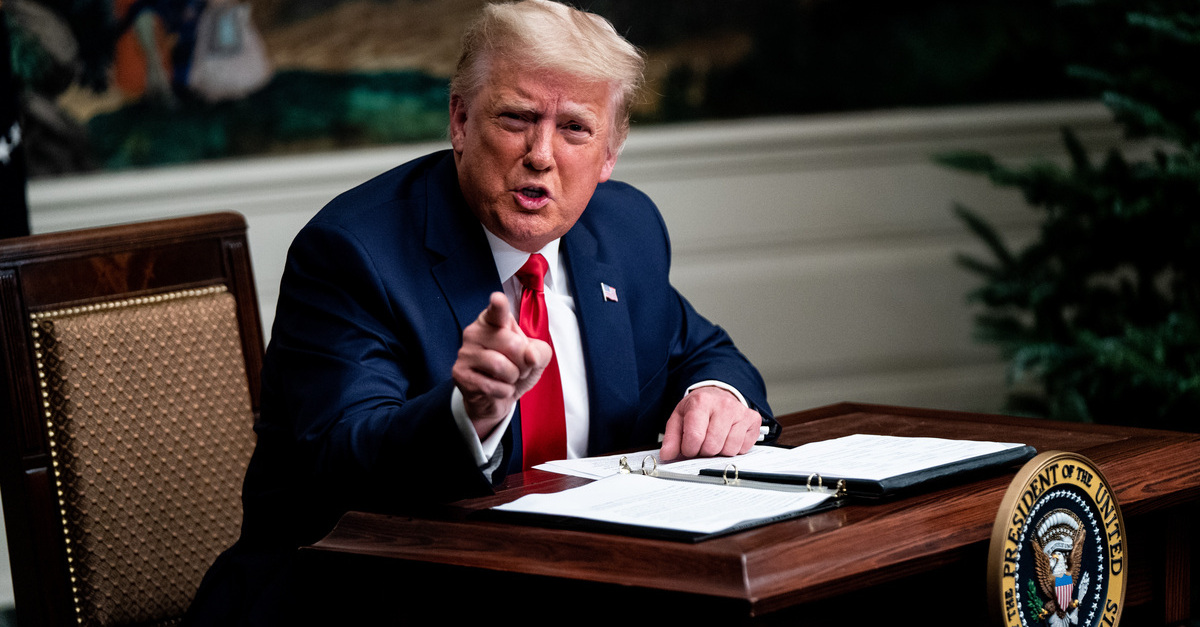
President Donald Trump on Wednesday made good on his threat to veto the $740 billion National Defense Authorization Act (NDAA), returning the bill to Congress sans signature because it didn’t contain a number of provisions long sought by the president dealing with legal protections for internet companies and military bases named after confederate leaders.
“My Administration recognizes the importance of the Act to our national security,” Trump said in a statement released by the White House. “Unfortunately, the Act fails to include critical national security measures, includes provisions that fail to respect our veterans and our military’s history, and contradicts efforts by my Administration to put America first in our national security and foreign policy actions.”
Trump renewed his call for the repeal of Section 230 of the Communications Decency Act after the hashtag #DiaperDon went viral last month—an apparent reference to the small desk the president sat behind during a pugnacious press conference. A couple of weeks later, Trump threatened to veto the NDAA unless Section 230 was repealed.
On Nov. 26, Trump called Section 230 a national security threat. He did so again today.
“The Act fails even to make any meaningful changes to Section 230 of the Communications Decency Act, despite bipartisan calls for repealing that provision. Section 230 facilitates the spread of foreign disinformation online, which is a serious threat to our national security and election integrity,” Trump said, apparently without a hint of irony. “It must be repealed.”
The widely misunderstood law protects internet companies from being held liable for content created by third-parties that is hosted on their websites.
As previously reported by Law&Crime, Trump had also threatened to veto the must-pass NDAA unless a bipartisan slate of legislators agreed to remove a provision requiring military bases currently named after Confederate leaders be renamed by the end of next year. On Wednesday Trump said the Confederate-named bases had taken on a significant that “far transcends their namesake.”
“My Administration respects the legacy of the millions of American servicemen and women who have served with honor at these military bases, and who, from these locations, have fought, bled, and died for their country. From these facilities, we have won two World Wars,” he said. “I have been clear in my opposition to politically motivated attempts like this to wash away history and to dishonor the immense progress our country has fought for in realizing our founding principles.”
Also contained in the NDAA was the “Improving Laundering Laws and Increasing Comprehensive Information Tracking of Criminal Activity in Shell Holdings,” or “ILLICIT CASH” Act, which would require the true owners of shell companies–business entities often used as fronts for criminal activity–to be disclosed to the U.S. Department of Treasury.
Though the NDAA passed both chambers of Congress with veto-proof majorities, certain Republican lawmakers remain staunchly loyal to Trump and appear unlikely to assist in overriding his decision without getting some concessions.
“Congress should vote to Repeal Section 230 as requested by President [Donald Trump],” Sen. Lindsey Graham (R-S.C.) tweeted after the veto. “I will not vote to override presidential veto unless effort is made to wind down Section 230.”
[Image via Erin Schaff/Pool/Getty Images]